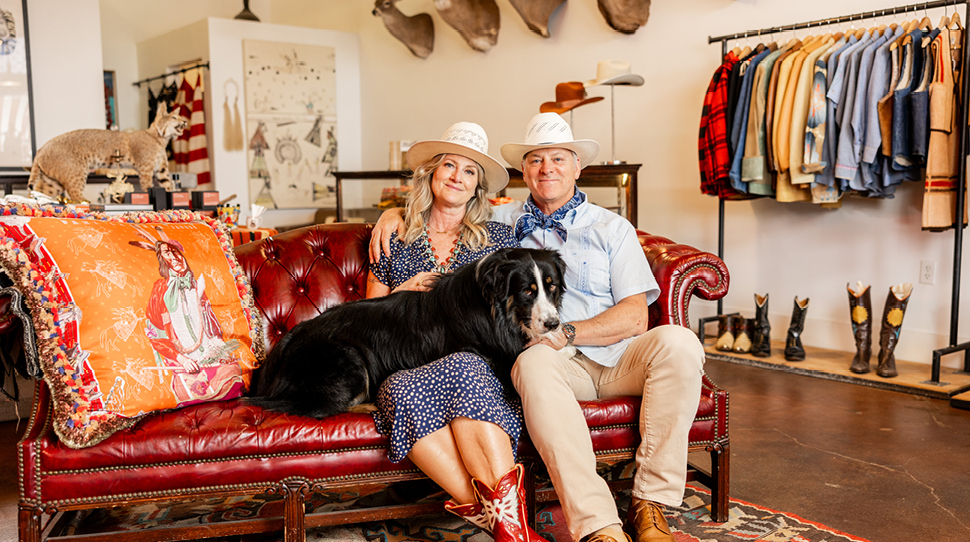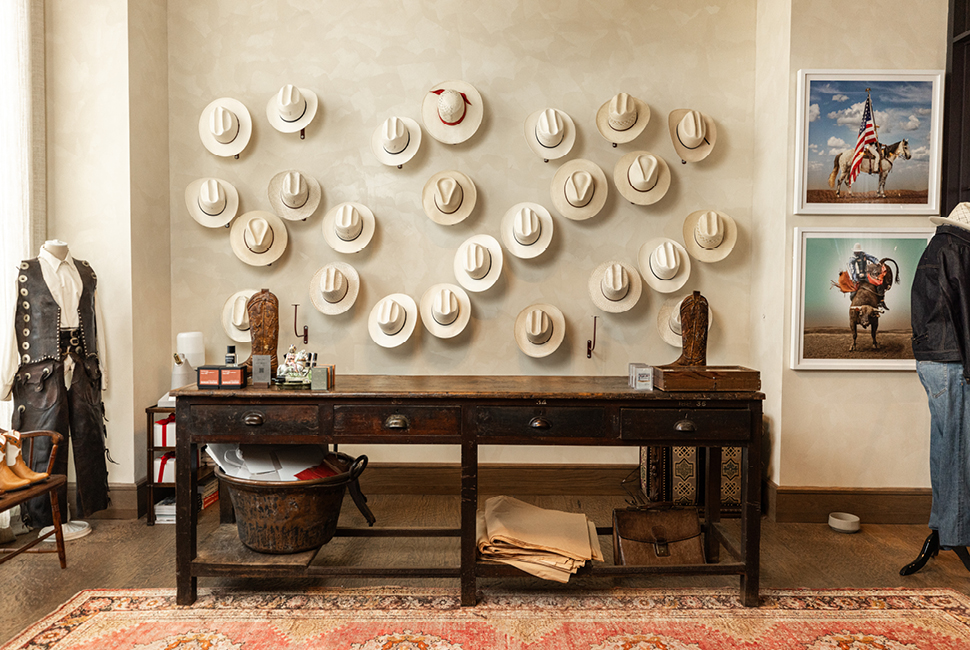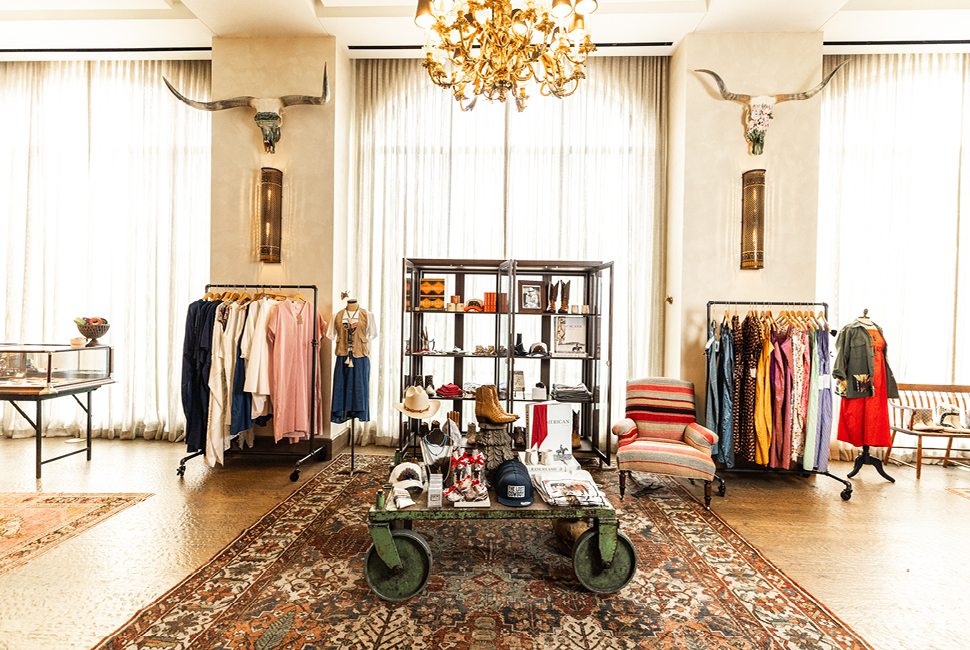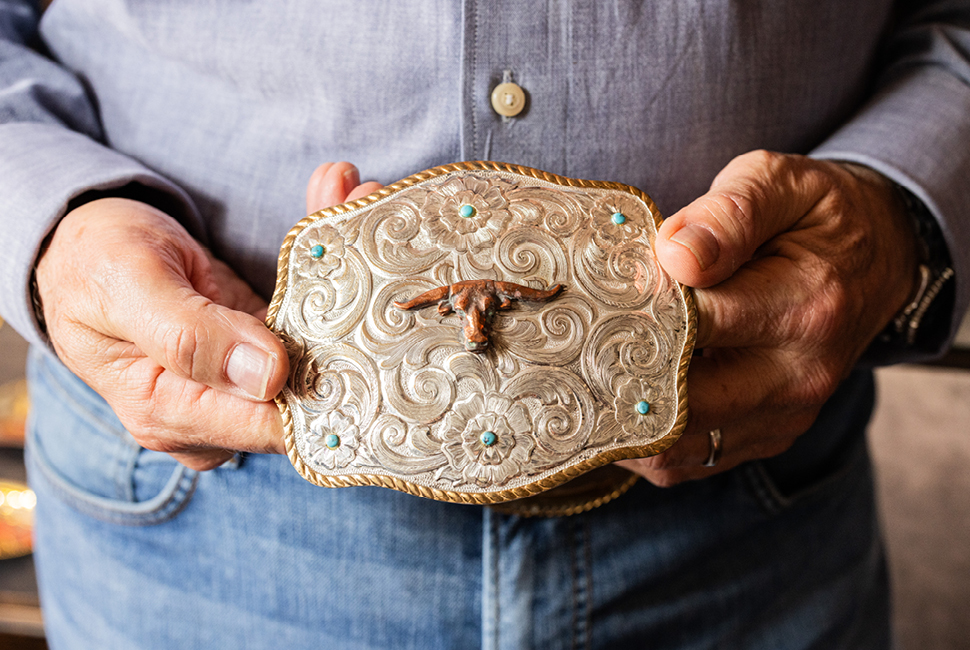

This story begins with a beaver felt hat. Over the years, the stylish topper grew synonymous with Fort Worth, Texas, thanks to Amon Carter, a turn-of-the-century businessman who designed the short-brimmed hat and gave them away by the thousands to U.S. presidents, British royalty and movie stars.
One such hat was left in a family member’s will to Rodger Chieffalo, a commercial real estate developer in Fort Worth, and it sparked a love for reimagining vintage Western wear. What was once a hobby for Chieffalo has evolved into Chieffalo Americana, a luxury Western boutique he runs today with his wife and business partner, Jackie. They recently debuted a second location: a pop-up inside the new Bowie House, Auberge Resorts Collection running through September 2025 that sells one-of-a-kind creations and upcycled items, such as suede fringe jackets, “wild rags” and cowboy boots from independent makers.
We recently sat down with the couple to discuss the brand’s origin story, its approach to sustainable fashion and the role Bowie House plays in it all.

What was the initial inspiration for Chieffalo Americana?
Jackie: We are inspired by Amon Carter who was really the biggest character to come out of Fort Worth.
Rodger: Amon Carter was this West Texas salesman who came to Fort Worth and went to work for one of the two newspapers at the turn of the century. Ultimately, he merged those two papers into one and built them into the largest newspaper in circulation in the Western United States.
He was an endlessly energetic promoter of Fort Worth and all things Western. He figured out the way to put Fort Worth on the map was to court the CEOs and the presidents of the biggest corporations in America, as well as the senators, the congressmen and the presidents of the United States. He created the signature beaver felt hats in 1920. He would give the hats to any VIP who came to Fort Worth, including all the presidents from Grover Cleveland to Dwight Eisenhower.
When Amon Carter died, the city carried the torch from that point forward and gave these hats to all the presidents who ever came to Fort Worth, including John F. Kennedy, on the morning that he was shot and killed in Dallas.
Sustainable fashion has become a huge trend. Do you position yourselves as a sustainable clothing brand?
Jackie: It might seem like sustainability is a trend, but I see it as more of a revival. That’s how we grew up. In the ’60s and ’70s, everyone had patches on their jeans, and you’d wear them until they fell apart. Once they fell apart, my mom, for example, would make a quilt. So, yes, our brand is green because it keeps things out of landfills. There are warehouses in Los Angeles full of bolts and bolts of amazing fabric, just sitting there, rotting.
Rodger:We’re looking back to an era when quality things were made in America. It was in the early- to mid-’70s when manufacturing started getting sent abroad [that things changed]. So many of the items we carry or rebuild have come from the ’50s, ’60s and early ’70s. Those items are better made than items today. You have young people today, after 30 or 40 years of fast fashion, who want something that is one of a kind and better made. They don’t want 50 items. They want one or two quality items.
Jackie: We have a lot of local makers who make one-of-a-kind things. We feel like that’s the ultimate luxury. Anyone can get a Goyard bag or go into Louis Vuitton. There are great dupes out there. But the sense of luxury is buying something you can’t get anywhere else. That’s who our customer is, the person who appreciates that. [Bowie House owner] Jo Ellard gets it, and when we moved into that space as a pop-up, it felt like home. The hotel’s geared for community and storytelling, so we felt like the perfect fit.
Rodger: If you think of the design of that hotel, it’s got a lot of antiques, one-of-a-kind things you don’t see anywhere else. The art collection is one of a kind and always changing. It’s part of the fiber of that hotel. It’s an ever-changing, ever-evolving environment that embraces vintage items.
Jackie: The hotel’s scene is a mix of locals and visitors, so we can tell these stories to people who are coming from far away. People come to the hotel because they love all the Auberge properties, and we get to capture that audience.
Rodger: We feel an obligation to represent our city accurately.

You’ve said that the brand began as a “hobby gone wild.” Could you tell the rest of Chieffalo Americana’s origin story?
Rodger: I was never a hat wearer. Most men now feel uncomfortable wearing anything but a baseball cap. About 20 years ago, a family member died and willed me his hat, made in a local hat store and designed by Amon Carter. I felt honored to have been given the hat and obligated to renovate it because it was in bad shape. It was like a brand-new hat when I got it back. I started wearing it and getting comments around town about how much people liked the hat.
My primary business is commercial real estate development. Still, I thought I was going to find these old hats here and everywhere around Fort Worth, and I was going to renovate them and give them to my investors as a way of saying thank you for doing business with me. My business is primarily in Fort Worth, so I thought it would be a clever gift.
After I went through all my investors, I gave them to my tenants when they signed leases with me. I started giving them to family and friends. I gave away several hundred hats before it got to the point where I needed to start selling them.
I had started making and collecting vintage cufflinks from vintage jewelry and old Western belt buckles and rebuilding them. And then along came Jackie with her fashion background. Four years ago, we decided to open the store.
Jackie: And get married!
Rodger: We combined our talents and knowledge to build a men’s and women’s clothing store. We started buying more categories of clothing items: vintage coats, selected vintage boots and belt straps. We also started buying new, American-made clothes from small makers: denim made in L.A., Western pearl-snap shirts made in Phoenix and Pendleton coats made in New York City.
It’s evident you were able to combine your talents. How did the collaboration with the Bowie House come about?
Rodger: Bowie House does an excellent job of representing Fort Worth in a stylish, upscale and thoughtful way. They found us and saw that we could provide that experience in a store. When we went to Bowie House, we rethought everything that we took to that store and asked, “What would represent the town of Fort Worth best? What are the items that guests need in that hotel? How can we accommodate those customers?”
That selection of offerings in the hotel is certainly a little different than what we have in the [standalone] store. Bowie House recognized that and saw that we made a genuine effort not just to bring what we had in the store. As a result, they rewarded us with an extended stay. We started as a three-month pop-up and have been there for a year and a half.

What’s the best-selling item at the Bowie House store?
Rodger:As a category, women’s clothing and the items we specifically made for the hotel.
Jackie: Women are in the mood to shop when they are in a great hotel. They’ve gone to the spa and out by the pool, so I said we need some caftans. They have a pool there! I wanted easy things that you could mix with a pair of low cowboy boots for a caftan, cowgirl kind of thing, where you could breeze down to Bricks and Horses and be good to go for dinner. We listened to the clients. For example, the Bowie House has a game room, so people would go in and ask if we sold decks of playing cards. We didn’t. But two days later, I asked my sources, and now, we have playing cards with a rodeo theme.
Rodger: We change the merchandise to fit each season in Fort Worth. For example, during the time of year when families come through to do something at Texas Christian University, we take a vintage buckle and put a little horned frog [mascot] icon on it.
Jackie: It’s such fun to wear something to the game that isn’t bookstore swag.
What do you imagine the next chapter of Chieffalo Americana will look like?
Rodger: We would love to do more pop-up stores in other regions of the country, expressing the fashion, style, history and heritage of those places.
